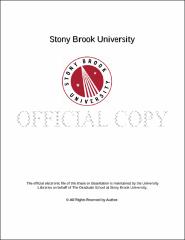| dc.identifier.uri | http://hdl.handle.net/11401/77592 | |
| dc.description.sponsorship | This work is sponsored by the Stony Brook University Graduate School in compliance with the requirements for completion of degree. | en_US |
| dc.format | Monograph | |
| dc.format.medium | Electronic Resource | en_US |
| dc.language.iso | en_US | |
| dc.publisher | The Graduate School, Stony Brook University: Stony Brook, NY. | |
| dc.type | Dissertation | |
| dcterms.abstract | People frequently reminisce about emotional occurrences with others in social settings. Past research has shown the benefits and costs of emotional or social influences on individual memory, but less is known about the interactive effects of these two factors. This dissertation research aimed to investigate the retrieval and transmission of emotional and nonemotional information by examining 1) how social interaction via group collaboration shapes one’s and a group’s memory for emotional information, 2) how shared or the absence of shared experiences among group members differentially affects the transmission of emotional memory. In Experiment 1, participants studied emotional (negative or positive) and nonemotional (neutral) pictures with words. Next, they completed three consecutive recall sessions either individually or in groups of three in one of three conditions: Individual-Individual-Individual (Control), Individual-Collaborative-Individual, and Collaborative-Collaborative-Individual. The results showed that the memory enhancement effects of emotional information observed in individual memory carries into group memory as well as into post-collaborative individual memory. It was also found that collaboration boosted post-collaborative individual recall of negative information to a greater extent than it did for positive information. In Experiment 2, participants completed three consecutive recall sessions in one of three conditions: Individual–Individual–Individual (Control), Collaborative–Collaborative (Identical group)–Individual, and Collaborative–Collaborative (Reconfigured group)–Individual. When individuals recalled the stimuli alone repeatedly, the memory enhancement effect of emotion was attenuated, illustrating the contributions of a more exhaustive retrieval effort. However, when people repeatedly retrieved emotional memory with others in groups, the memory enhancement effect of emotion was reinforced and boosted, especially for negative information. Finally, people remembered more negative information than positive information mainly when the information was shared with other group members, and did so more when they were asked to recall information with the same group of people, compared to a different group of people. Together, these findings converge to show that the retrieval and spread of emotional memory largely depends on whether the remembering of emotional experiences occurs in social or non-social context, as well as on whether such experiences are shared or unshared. | |
| dcterms.abstract | People frequently reminisce about emotional occurrences with others in social settings. Past research has shown the benefits and costs of emotional or social influences on individual memory, but less is known about the interactive effects of these two factors. This dissertation research aimed to investigate the retrieval and transmission of emotional and nonemotional information by examining 1) how social interaction via group collaboration shapes one’s and a group’s memory for emotional information, 2) how shared or the absence of shared experiences among group members differentially affects the transmission of emotional memory. In Experiment 1, participants studied emotional (negative or positive) and nonemotional (neutral) pictures with words. Next, they completed three consecutive recall sessions either individually or in groups of three in one of three conditions: Individual-Individual-Individual (Control), Individual-Collaborative-Individual, and Collaborative-Collaborative-Individual. The results showed that the memory enhancement effects of emotional information observed in individual memory carries into group memory as well as into post-collaborative individual memory. It was also found that collaboration boosted post-collaborative individual recall of negative information to a greater extent than it did for positive information. In Experiment 2, participants completed three consecutive recall sessions in one of three conditions: Individual–Individual–Individual (Control), Collaborative–Collaborative (Identical group)–Individual, and Collaborative–Collaborative (Reconfigured group)–Individual. When individuals recalled the stimuli alone repeatedly, the memory enhancement effect of emotion was attenuated, illustrating the contributions of a more exhaustive retrieval effort. However, when people repeatedly retrieved emotional memory with others in groups, the memory enhancement effect of emotion was reinforced and boosted, especially for negative information. Finally, people remembered more negative information than positive information mainly when the information was shared with other group members, and did so more when they were asked to recall information with the same group of people, compared to a different group of people. Together, these findings converge to show that the retrieval and spread of emotional memory largely depends on whether the remembering of emotional experiences occurs in social or non-social context, as well as on whether such experiences are shared or unshared. | |
| dcterms.available | 2017-09-20T16:52:57Z | |
| dcterms.contributor | Luhmann, Christian | en_US |
| dcterms.contributor | Rajaram, Suparna | en_US |
| dcterms.contributor | Moyer, Anne | en_US |
| dcterms.contributor | Lutterbie, John. | en_US |
| dcterms.creator | Choi, Hae-Yoon | |
| dcterms.dateAccepted | 2017-09-20T16:52:57Z | |
| dcterms.dateSubmitted | 2017-09-20T16:52:57Z | |
| dcterms.description | Department of Experimental Psychology. | en_US |
| dcterms.extent | 87 pg. | en_US |
| dcterms.format | Monograph | |
| dcterms.format | Application/PDF | en_US |
| dcterms.identifier | http://hdl.handle.net/11401/77592 | |
| dcterms.issued | 2015-05-01 | |
| dcterms.language | en_US | |
| dcterms.provenance | Made available in DSpace on 2017-09-20T16:52:57Z (GMT). No. of bitstreams: 1
Choi_grad.sunysb_0771E_12481.pdf: 826312 bytes, checksum: 4372b0a6ac0f429c671e342ddd736421 (MD5)
Previous issue date: 2015 | en |
| dcterms.publisher | The Graduate School, Stony Brook University: Stony Brook, NY. | |
| dcterms.subject | collaborative memory, emotional memory, social transmission | |
| dcterms.subject | Experimental psychology | |
| dcterms.title | Social Transmission of Emotional Memory | |
| dcterms.type | Dissertation | |

